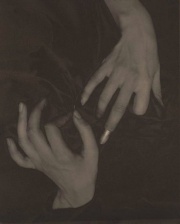Difference between revisions of "Palladium print"
Jump to navigation
Jump to search
| Line 2: | Line 2: | ||
== Description == | == Description == | ||
| − | A nonsilver photographic printing paper that used potassium tetrachloropalladite as the light sensitive compound. Palladium prints were first made in 1859, but there used was not widespread until the late 1910s. Palladium was used as an intensifying agent for [[silver gelatin paper|silver gelatin]] prints. It produced prints | + | A nonsilver photographic printing paper that used potassium tetrachloropalladite as the light sensitive compound. Palladium prints were first made in 1859, but there used was not widespread until the late 1910s. Palladium was used as an intensifying agent for [[silver gelatin paper|silver gelatin]] prints. It produced prints similar to [[platinum]], but it costs less. Palladium and platinum are often combined. |
== Synonyms and Related Terms == | == Synonyms and Related Terms == | ||
Revision as of 13:55, 7 July 2014
Description
A nonsilver photographic printing paper that used potassium tetrachloropalladite as the light sensitive compound. Palladium prints were first made in 1859, but there used was not widespread until the late 1910s. Palladium was used as an intensifying agent for silver gelatin prints. It produced prints similar to Platinum, but it costs less. Palladium and platinum are often combined.
Synonyms and Related Terms
palladiotype
Additional Information
° A.Gottlieb "Chemistry and Conservation of Platinum and Palladium Photographs" JAIC 34:11-32, 1995.° C.McCabe, L.Glinsman, "Understanding Alfred Stieglitz' Platinum and Palladium Prints: Examination by X-ray Fluorescence Spectrometry" Conservation Research, National Gallery of Art, 1995.
Authority
- B. Gascoigne, How to Identify Prints, Thames & Hudson, London, 2004
- Luis Nadeau, Encyclopedia of Printing, Photographic, and Photomechanical Processes, Atelier, New Brunswick, 1997 Comment: palladiotype

